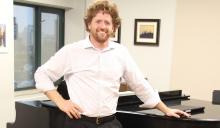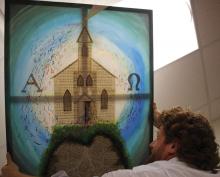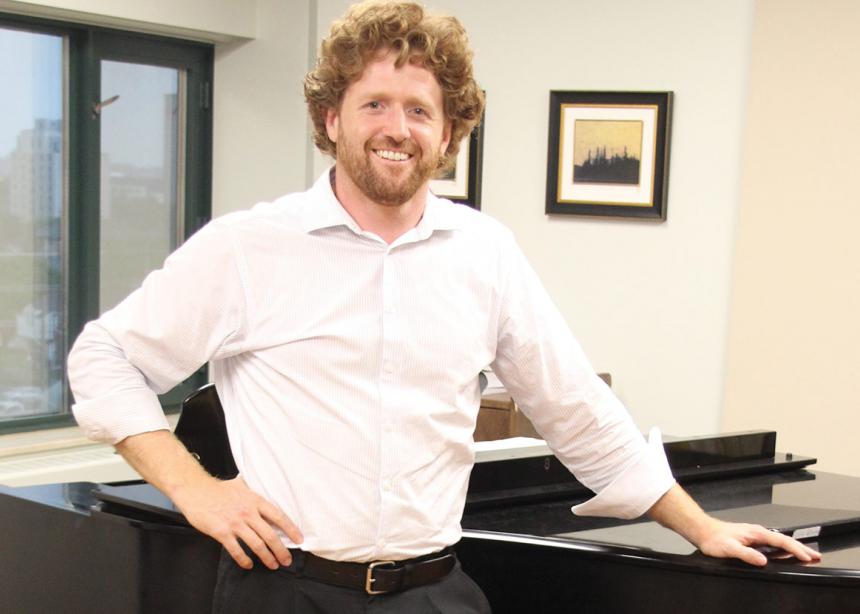Like most musicians and artists, Brandon Leis uses his gifts in many places and in many ways to make a living.
Most recently, he was appointed as the new music director of the Menno Singers, a Waterloo Region choir founded in 1955 by Abner Martin. Besides that, since 2003 he has been the music director at Stirling Avenue Mennonite Church in Kitchener and a voice instructor at Wilfrid Laurier University. He also has a private studio of students, consults with congregations about “music problems,” and is an avid promotor of “community arts,” particularly music.
Community arts is a relatively new field, having been founded in 2003 by Lee Higgins of the United Kingdom. Leis is one of its first practitioners. The goal of community music is to move away from performance to participation, from audience to practitioners.
In stark contrast to artists like classical pianist Glenn Gould and the Beatles, who gave up performing and only recorded, in order to create a perfect piece of music with no interference from the audience, Leis instead invites and encourages participation, even if a person has little or no training.
“The questions are,” he says, “ ‘Why do we do music?’ ‘How do we do music?’ and ‘What music do we do?’ ” These are the questions he asks when he is consulting with congregations who find themselves with “music problems.” Often the problem is not music at all, but simply the visible outcome of other problems. But by looking at these three questions, congregations can often rethink their purpose and goals.
One of the major issues in community music is power. When trained musicians make room for the untrained, they become vulnerable and their authority is eroded. But, Leis points out, music has belonged to the community through the ages, being made at home, in the community and in places of worship. This is a form of “cultural democracy,” he says.
Like many other fields, music is becoming interdisciplinary, returning to its place as part of the community. Music, he says, is the “community expressing itself.” Leis sees the joy of people at Stirling Avenue regularly as they get to make music with others.
With regard to the Menno Singers, his first two-year contract will involve “a focus on the role of a choir like the Menno Singers.” Leis is talking to other conductors, including Leonard Enns of the DaCapo Singers, Mark Vuorinen of the Grand Philharmonic, and Peter Nikiforuk, recently retired music director of the Menno Singers, and they are thinking about collaborations. Choirs like Laurier’s Inshallah singers, a multi-faith, multicultural choir led by Debbie Lou Ludolph, also interest Leis, especially as they practise “paperless music,” allowing people who can’t read music to learn by rote.
This fits Leis’s theory and practice of allowing people to become themselves through community and to be enabled through music.

Brandon Leis, the new music director for Menno Singers, in his studio in the Music Building at Wilfrid Laurier University in Waterloo, Ont. (Photo by Dave Rogalsky)

Brandon Leis, the new music director for Menno Singers, holds up a piece of art he created. The church, founded on sacred music and filled with it, exudes music through the cross on the steeple. Or is it receiving heavenly inspiration through the cross and being filled with spiritual music? Or maybe both. Only visible when held up to the light are the Alpha and Omega, God’s beginning and end. The piece hangs over his desk—and coffee maker—in his studio in the Music Building at Wilfrid Laurier University in Waterloo. (Photo by Dave Rogalsky)


Add new comment
Canadian Mennonite invites comments and encourages constructive discussion about our content. Actual full names (first and last) are required. Comments are moderated and may be edited. They will not appear online until approved and will be posted during business hours. Some comments may be reproduced in print.